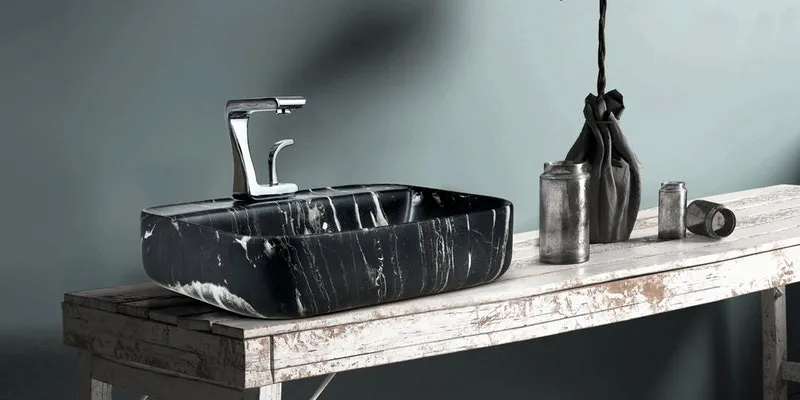How a small-time trader built a Rs 50 Cr turnover bath fittings and sanitaryware company
Vinay Jain dreamed of making it big in the capital city, but he remained a middleman in the Delhi market for bath fittings. His big break came when a supplier asked Vinay to buy a struggling manufacturing business.
In 2003, Vinay Jain made the journey from Bhiwadi in Rajasthan to Delhi. The young Commerce graduate had Rs 2 lakh in his pocket and a dream to make it big in the capital city.
The 21-year-old graduated from Rajasthan University in Alwar, but did not wish to take over his father’s mustard oil mill. He wanted to start something new, and decided to go to a different city to try his luck.
After reaching Delhi, Vinay did not know what to do or where to begin. He started talking to the locals as he contemplated his next move.
When Vinay met with a leading bath fittings manufacturer, he saw the opportunity to become a trader for the company. Seeing how the market for sanitaryware was fairly unorganised and fragmented, he decided to take the plunge.
Vinay invested his money in setting up Emm Kay Industries, a trading house in Chawri Bazar, which is a wholesale market for brass, copper, and paper products.
For the next three years, Vinay traded bath fittings such as faucets and showers. But he wasn’t satisfied; his aspirations were bigger than being a small-time trader.
“Somewhere in my heart, I was not happy with the quality and consistency of products that I was trading. I started dreaming of owning a factory where I could manufacture high-quality bath fittings products,” the 41-year-old tells SMBStory.

Vinay Jain, Founder, President and CEO, Grafdoer
From trading to manufacturing
Setting up a manufacturing facility required high initial investments. Vinay did not have the capital to start his own factory.
One day, he was approached by a supplier for the bath fittings brand. He learned that the supplier’s manufacturing business was not in good shape. It had accumulated too many losses and turned into a sick unit.
“I got to know that this supplier wanted to wrap up his business. He wanted to sell it, but it was in such bad shape that nobody wanted to buy it,” Vinay recalls.
He studied it closely, understood its production process, and discovered that it had potential to become profitable if it was run properly. Further, if he purchased and revived it, it could be the manufacturing business he had always dreamed of.
However, at that time, Vinay didn’t have enough capital to buy it. But he didn’t want to let go of this chance, so he had to find some other way.
“I came up with an innovative idea where I would work with the sick unit for two or three months, make revenues, and then repay the money in installments. Since the supplier had no other buyers, it would be a win-win for both parties,” Vinay says.
The supplier agreed to the deal.
In 2006, Vinay became the proud owner of a bath fittings manufacturing unit in Mayapuri, Delhi, and retained the Emm Kay Industries name.
Initial challenges and growth
Vinay’s dream of having his own manufacturing facility was fulfilled, but the situation was far from utopian. He was a trader and had no technical knowledge about manufacturing. He did not know anything about machines, raw material, or labour.
But he saw there were people he could learn from: his workers, some of whom he had hired and some who worked for the unit even before Vinay took over. Like any other worker, he began working on the production floor and slowly acquired the technical knowledge he was lacking.
“I remember spending sleepless nights working in the factory and learning new things from the production employees. I believed I had to get my own hands dirty to fully understand how things worked,” he says.
Besides diving deep into the manufacturing, his strategy for converting the sick unit into a healthy business involved scaling production and building a robust network of distributors.

A Grafdoer ad for a faucet range
He knew that enterprise and individual customers were increasingly looking to combine convenience with functionality and luxury with technology. And this trend would boost demand in the Indian bath fittings market.
Vinay grew his 12-member team of skilled workers to over 300 people, and started manufacturing bath fittings in different price ranges, such as from economy to luxury.
He then started manufacturing sanitaryware in 2010, and established a parent company, VMS Bathware. In the same year, he started another manufacturing unit in his hometown of Bhiwadi.
“The strategy was simple: to produce a lot of bath fittings and sanitaryware products of durable quality designed keeping Indian conditions in mind,” he says.
Product and retail strategy
Different types of faucets, showers, wash basins, toilets, and accessories became part of Vinay’s product portfolio. The products were then sold to dealers and distributors, who would resell to a range of enterprise and individual customers all across the country.
“We built up a distributor network of 150 dealers who we sold to directly, and another 700 to 800 dealers who we reached through distributors,” Vinay says, adding, “We took feedback from consumers and traders who purchased from us, and used the information to innovate and create new products.”
Vinay’s company expanded, riding the wave created by a steadily growing market for bath fittings in India. In 2015, Vinay started making kitchenware and boosted his range of bath fittings. The idea was to provide customers with a consistent design and aesthetic from a single brand rather than have different designs from different brands.
“The pricing is affordable for customers from all segments. For deciding the pricing of most of the products, we used the bottom-up approach, considered the pricing of our contemporaries, and wanted to offer maximum value for money,” he explains.
In 2019, Vinay launched Grafdoer, a brand under which he brought all the bathware, sanitaryware, kitchenware and accessories he manufactured.
These milestones, however, are not something Vinay dwells on.
“I don’t remember or celebrate milestones because it has been a continuous journey for me. Today, Grafdoer is a Rs 50 crore turnover company and now strives to reach Rs 100 crore turnover,” he says.

Grafdoer's bath fittings
Being present and active on digital platforms has an important role to play in reaching this target. According to Vinay, Grafdoer is seeking to grow organically and inorganically by leveraging social media platforms and marketing its products.
CERA Sanitaryware, Parryware, Jaquar, and Hindware are presently the largest players in the Indian bath fittings market. But this market remains largely fragmented, giving smaller brands like Grafdoer the opportunity to increase their market presence.
“We believe in looking within rather than outside. We are our own competition and we compete with ourselves - what we produce today has to be better than what we were producing yesterday. We do look outside, but only to listen to the voices of customers and trade partners,” Vinay says.
(Edited by Evelyn Ratnakumar)









